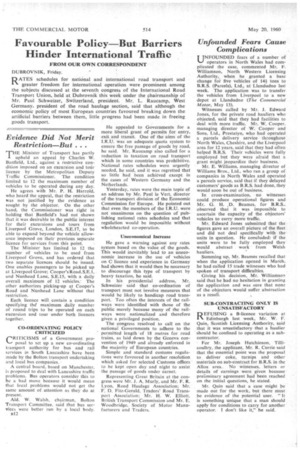Favourable Policy—But Barriers
Page 46

If you've noticed an error in this article please click here to report it so we can fix it.
Hinder International Traffic
FROM OUR OWN CORRESPONDENT DUBROVNIK, Friday.
pp ATES schedules for national and international road transport and " greater freedom for international operation were prominent among the subjects discussed at the seventh congress of the International Road Transport Union, held at Dubrovnik this week under the chairmanship of Mr. Paul Schweizer, Switzerland, president. Mr. L. Raucamp, West Germany, president of the road haulage section, said that although the economic policy of most European countries favoured breaking down the artificial barriers between them, little progress had been made in freeing goods transport.
He appealed to Governments for a more liberal grant of permits for entry, exit.and transit. One of the aims of the I.R.U. was an adequate quota system to ensure the free passage of goods by road, he said, Mr. Raucamp also called for a reduction in taxation on road transport which in some countries was prohibitive. National rates schedules were urgently needed, he said, and it was regretted that so little had been achieved except in the cases of Western Germany and the Netherlands. Yesterday, rates were the main topic of art address by Mr. Paul le Vert, director of the transport division of the Economic Commission for Europe. He pointed out that even the members of the I.R.U. were not unanimous on the question of publishing national rates schedules and that regulation would be impossible without wholehearted co-operation.
Uneconomical Increase He gave a warning against any rates system based on the value of the goods. This would inevitably lead to an uneconomic increase in the use of vehicles on C licence and experience in Germany had shown that it would then be necessary to discourage this type of transport by heavy taxation, he said.
In his presidential address, Mr. Schweizer said that co-ordination of transport must not involve measures that would be likely to handicap road transport Too often the interests of the railways were identified with those of the public merely because many of the railways were nationalized and therefore given a privileged position. The congress resolved to call on the national Governments to adhere to the permitted length of 18 metres for road trains, as laid down by the Geneva convention of 1949 and already enforced in the majority of European countries. Simple and standard customs regulations were favoured in another resolution which asked for selected Customs offices to be kept open day and night to assist the passage of goods under carnet. Representing Great Britain at the congress were Mr. J. A. Murly, and Mr. F. R. Lyon, Road Haulage Association; Mr. F. D. Fitz-Gerald, Traders' Road Transport Association; Mr. H. W. Elliott, British Transport Commission and Mr. E. Woodbridge, Society of Motor Manufacturers and Traders.




















































































































